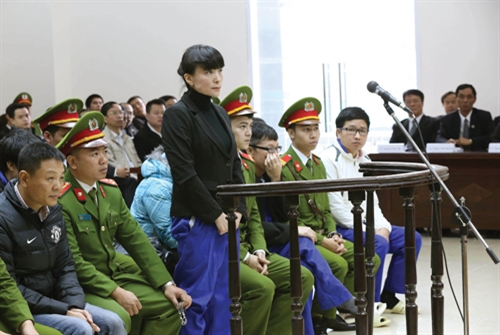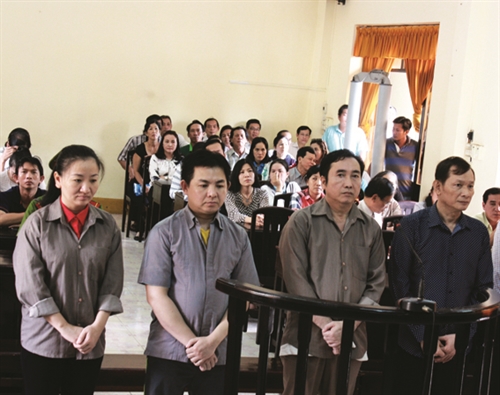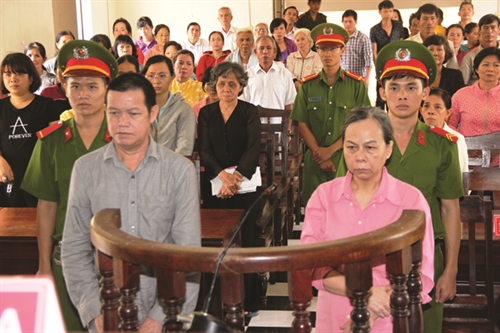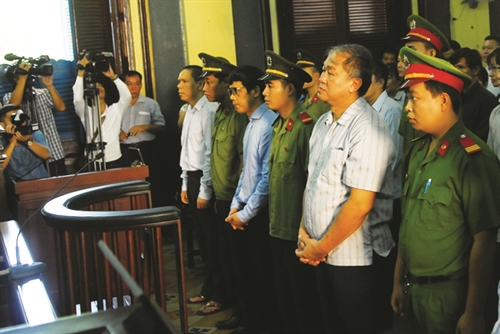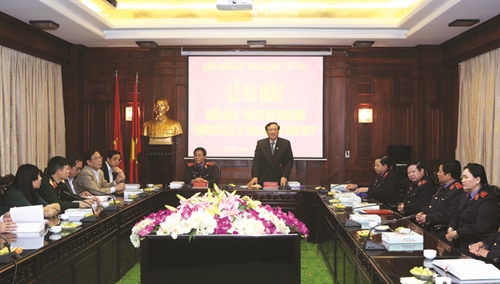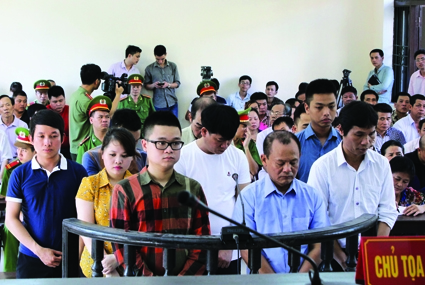Nguyen Thi Phuong Ha, LL.M
Law Faculty
Da Lat University
Concerning execution of court judgments and decisions, Article 106 of the 2013 Constitution of Vietnam stipulates: “Judgments and decisions of people’s courts which have taken legal effect shall be respected by agencies, organizations and individuals and shall be strictly observed by concerned agencies, organizations or individuals.” In Vietnam, while execution of criminal judgments and execution of civil judgments are regulated by two separate laws, i.e. the 2010 Law on Execution of Criminal Judgments and the 2008 Law on Execution of Civil Judgments (revised in 2014). Issues related to the execution of administrative judgments are incorporated in the Law on Administrative Procedure.
At a time when no law on administrative procedure was in place yet, issues related to complaints and lawsuits on administrative matters were addressed by the 1996 Ordinance on Settlement of Administrative Cases, revised twice in 1998 and 2006. However, this Ordinance and its revised versions made no mention on execution of administrative judgments. Administrative judgments were then executed mainly in accordance with the 1993 Ordinance on Execution of Civil Judgments (revised in 2004) and later the 2008 Law on Execution of Civil Judgments. This Law serves as an important legal basis for the execution of civil judgments, embracing also property-related parts in administrative judgments.
On November 24, 2010, at the 8th session of the XIIth National Assembly, the 2010 Law on Administrative Procedure was passed, marking an important step in opening the court’s door to people’s legal actions in administrative cases. The Law provides for the first time issues related to the execution of court judgments and decisions concerning administrative cases in a separate chapter (Chapter XVI containing Articles 241 thru 248). However, the practical implementation of these articles revealed some problems which were attributable to the lack of detailed guidance on execution of administrative judgments, limited jurisdiction of the courts to quash administrative decisions which were complained about or sued against and the lack of stringent penalties against those who failed to execute administrative judgments. Neither the Government not the Judicial Council of the Supreme People’s Court issued any guidance on the execution of administrative judgments.
On November 25, 2015, the XIIIth National Assembly at its 10th session passed a new Law on Administrative Procedure which again provides the execution of administrative judgments. Notably, it replaces the procedures for urging the execution of administrative judgments with those for voluntary execution and establishes the power of the courts that have conducted first-instance trial of administrative cases to issue decisions to enforce their judgments. The Government also issued Decree No. 71/2016/ND-CP (Decree 71) to provide the time limit, order and procedures for execution of administrative judgments and the handling of persons who fail to execute these judgments.
 |
| Competent authorities of Ben Tre province destroy exhibits used in administrative violations__Photo: VNA |
Agencies managing and enforcing administrative judgments
Article 313 of the 2015 Law on Administrative Procedure (the Law) states that the Government and the Ministry of Justice are responsible for performing the state management of the execution of administrative judgments.
The Law assigns the Government to perform the unified state management of the execution of administrative judgments nationwide in coordination with the Supreme People’s Court and the Supreme People’s Procuracy. The Government is also tasked to report on a yearly basis on the execution of administrative judgments to the National Assembly.
This provision differs from Article 166 of the 2008 Law on Execution of Civil Judgments (revised in 2014) in that it no longer assigns the Government to direct its agencies and provincial-level People’s Committees in the enforcement of (civil) judgments. This is simply because subject to administrative trial are administrative decisions or acts or dismissal decisions which are issued by governmental agencies and provincial-level People’s Committees.
Assisting the Government in performing the state management of the execution of administrative judgments, the Ministry of Justice is responsible for issuing or proposing competent authorities to issue legal documents on execution of administrative judgments. In addition, it is assigned to:
* ensure payrolls, physical facilities and equipment for the state management of the execution of administrative judgments;
* guide, direct and provide professional training in the management of the execution of administrative judgments;
* conduct inspection, and settle complaints and denunciations about the management of the execution of administrative judgments;
* report on the execution of administrative judgments to the Government; and
* work out and implement plans on statistics, monitoring and review of the execution of administrative judgments.
Particularly, the Ministry is assigned to propose the Prime Minister to examine responsibility of provincial-level People’s Committees or their chairpersons, ministers, or heads of ministerial-level or government-attached agencies against administrative judgments are issued.
The General Department of Civil Judgment Enforcement assists the Minister of Justice in performing the above tasks and other tasks and powers defined in Decree 71.
Point h, Clause 1, Article 311 of the Law stipulates: “Rulings on property in the court’s judgments or decisions shall be executed in accordance with the law on execution of civil judgments.” This means that civil judgment enforcement agencies are responsible for executing property-related parts of administrative judgments.
Decree 71 specifies that this responsibility rests with provincial-level and district-level civil judgment enforcement agencies.
For discharging this responsibility, provincial-level civil judgment enforcement departments are tasked to:
* monitor the execution of administrative judgments;
* propose the General Department of Enforcement of Civil Judgments to request competent authorities to inspect, urge, direct and handle responsibility of provincial-level People’s Committees or their chairpersons and central-level agencies, organizations and persons in executing administrative judgments;
* propose or request competent authorities to inspect, urge, direct and handle responsibility of persons, agencies and organizations in executing judgments and decisions of courts of the same level, excluding provincial-level People’s Committees or their chairpersons and central-level agencies, organizations and persons;
* provide professional guidance on the management of execution of administrative judgments to civil judgment enforcement sub-departments;
* sanction administrative violations; and
* review and report on the execution of administrative judgments.
District-level civil judgment enforcement sub-departments are assigned to monitor the execution of administrative judgments; propose or request competent agencies to inspect, urge, direct and handle responsibility of persons, agencies and organizations obliged to execute judgments and decisions of courts of the same level; sanction administrative violations; and make statistics and reports on the execution of administrative judgments.
Decree 71 assigns several duties to ministries, ministerial and government-attached agencies in the execution of administrative judgments:
+ To direct and guide the execution of court judgments and decisions related to the fields under their management;
+ To seriously perform their obligations in case administrative judgments are issued against them;
+ To set out criteria for evaluating their officials and commend and reward agencies, organizations and persons under their management that have recorded merits in the execution of administrative judgments; and
+ To send biannual, annual or extraordinary reports on results of the execution of administrative judgments to the Ministry of Justice for summarization and reporting to the Government.
Decree 71 also clearly defines the tasks and powers of People’s Committees at all levels in the execution of administrative judgments.
Provincial- and district-level People’s Committees are tasked to direct lower-level People’s Committees and their professional bodies in seriously executing administrative judgments.
People’s Committees at all levels are required to seriously perform their obligations in case administrative judgments are issued against them;
They are also responsible for directing the execution of administrative judgments on complicated cases which have impacts on their local socio-economic development or security and social order.
On a biannual, annual or irregular basis, provincial-level People’s Committees must report to the Ministry of Justice while district- and commune-level People’s Committees report to People’s Committees and civil judgment enforcement agencies of the immediate higher level on results of the execution of administrative judgments in their localities.
Execution procedures
Article 311 of the Law provides the voluntary execution of court judgments or decisions.
It further states that court judgments or decisions that compel revision of a voter list or application of a provisional urgent measure must be executed without delay.
If falling into one of the following cases, a court judgment or decision must be executed within 30 days from the date of its receipt:
+ It rejects the lawsuit over an administrative decision, a disciplinary decision on dismissal or a decision on settlement of a complaint about a decision on handling a competition case or voter list. The involved parties have to continue executing such decision in accordance with law;
+ It cancels the whole or part of an administrative decision or a decision on settlement of a complaint about a decision on handling a competition case, and the decision or part of the decision which has been cancelled is no longer effective;
+ It cancels a disciplinary decision on dismissal, which is no longer effective. In this case, the head of the agency or organization that has issued such decision has to execute the court judgment or decision;
+ It declares an administrative act illegal; or
+ It declares the non-performance of a task or an official duty illegal. In this case this task or duty must be performed in accordance with law.
Within 3 working days after the expiration of the time limit for voluntary execution, the executing agency has to notify in writing the judgment execution result to the court that has conducted the first-instance trial, the procuracy and civil judgment enforcement agency at the same level with such court, and concurrently report it to its immediate superior agency (Clause 2, Article 10 of Decree 71).
According to Article 14 of Decree 71, same-level civil judgment enforcement agencies have the duties of receiving the court judgments or decisions on administrative cases and assigning their executors to monitor their execution. Within 5 working days after receiving a court judgment or decision, it must send a notice of voluntary execution to the executing agency. For a court judgment or decision compelling revision of a voter list or application of a provisional urgent measure, it must send a notice immediately to the executing agency.
The 2015 Law on Administrative Procedure (the Law) provides for the first time the filing of requests for issuance of decisions to compel execution of administrative judgments, replacing previous provisions on urging of the execution. Accordingly, a person in favor of whom a judgment is to be executed (judgment creditor) is entitled to request, within one year from the expiration of the time limit for voluntary execution, the court that has conducted first-instance trial of the administrative case to issue a decision to compel the execution of the judgment by the person who is obliged to execute the judgment (judgment debtor) but fails to do so within that time limit.
If a judgment creditor cannot file such request within one year due to an objective obstacle or a force majeure event, this time limit may be extended for a time equal to the period during which such obstacle or event occurs (Clause 1, Article 312 of the Law).
A judgment creditor may either make a request by himself or authorize in writing or orally another person to do so. Within five working days after receiving a request from the judgment creditor, the court must issue a decision compelling the execution and send it to the judgment debtor, the head of the agency managing the judgment debtor, the judgment creditor, the same-level people’s procuracy and the civil judgment enforcement agency (Clause 2, Article 312 of the Law).
The judgment debtor has to execute the judgment as soon as he receives the court’s decision (Clause 1, Article 12 of Decree 71) and notify, within five working days after completing the judgment execution, the execution result to the court and the same-level people’s procuracy and civil judgment enforcement agency, and concurrently report it to his managing agency (Clause 3, Article 12 of Decree 71).
Within three working days after receiving a decision compelling the judgment execution, the head of the judgment debtor’s managing agency must issue a document to direct the judgment debtor in properly executing the judgment (Clause 1, Article 13 of Decree 71). Also within that time limit, the enforcer assigned to monitor the judgment execution must urge the judgment debtor to perform his obligations stated in the judgment. What has been done by such enforcer and judgment debtor must be recorded in a minutes (Clause 3, Article 14 of Decree 71).
In addition to the above general order and procedures for execution of court judgments in administrative cases, Decree 71 also establishes in Articles 15 thru 19 procedures for execution of specific administrative judgments, such as those on rejection of lawsuit initiation petitions and cancellation of administrative decisions or decisions on settlement of complaints about decisions on handling of competition cases.
Responsibility in the execution of administrative judgments
The handling of persons responsible for the execution of administrative judgments was previously stipulated in the 2010 Law on Administrative Procedure (the 2010 Law) but not yet detailed in any guiding decree. Besides, various handling measures were provided in various laws and sub-laws, such as the 2008 Law on Cadres and Civil Servants; Decree 34 dated May 17, 2011, on disciplining of civil servants; the 2010 Law on Public Employees; the 2012 Law on Handling of Administrative Violations; Decree 110 dated September 24, 2013, on sanctioning of administrative violations in the field of judicial support, judicial administration, marriage and family, execution of civil judgments and bankruptcy of businesses and cooperatives; and the 1999 Penal Code (revised in 2009). This has made the handling of judgment debtors who deliberately refuse to execute their judgments a tough task, causing decade-long delays in the execution of judgments in many administrative cases.
Though the 2015 Law makes no changes to the 2010 Law’s provisions on handling of violations in the execution of judgments, Decree 71 devotes a whole chapter to this issue, setting out specific handling measures:
- Disciplinary actions, which apply to civil servants and public employees that violate regulations on execution of administrative judgments. These violators may face reprimand, caution, salary lowering, demotion, and sacking (Articles 21 thru 26).
- Administrative sanctions, which apply to agencies, organizations and individuals that intentionally fail to abide by judgments or obstruct the execution of judgments (Article 27).
- Examination of penal liability
“1. Persons who fail to execute or abide by judgments or intentionally obstruct the execution of judgments in a manner that constitutes a criminal offense shall be examined for penal liability under the Penal Code.
2. Heads of agencies or heads of immediate superior agencies of civil judgment debtors, civil judgment enforcement agencies and state management agencies in charge of administrative judgment execution shall, depending on their functions, tasks and powers, request competent agencies to examine penal liability of persons who show signs of violation of the criminal law in the execution of administrative judgments.”
The crime of failure to execute judgments was subject to penalties ranging from non-custodial reform of up to three years to imprisonment of between six months and three years under Article 305 of the 1999 Penal Code. Under the 2015 Penal Code, these penalties are harsher, including imprisonment of up to 10 years followed by a ban from holding any managerial post for between one year and five years.
Regarding material liability, Article 29 of Decree 71 states: “Judgment debtors who cause damage in the course of judgment execution shall remedy consequences of their acts and pay compensation for damage in accordance with the law on state compensation liability and the civil law.”
In addition to the above handling measures, Decree 71 also requires publicization of information about persons who fail to execute judgments and evaluation of cadres, civil servants and public employees who violate the law on execution of administrative judgments.
Regarding the publicization of information about failure to execute judgments, Article 30 of Decree 71 says:
“1. Within five working days after receiving a decision compelling execution of an administrative judgment, a Department of Civil Judgment Enforcement shall publicly post such decision on its website, for cases falling under its monitoring competence and attached Sub-Departments of Civil Judgment Enforcement; and at the same time, post such information on the Portal of the Directorate of Civil Judgment Enforcement of the Ministry of Justice and on the Portal of the Government, for cases where judgment debtors are provincial-level People’s Committees or their chairpersons, ministers, heads of ministerial-level agencies or government-attached agencies.
2. Information to be publicized includes:
a/ Name and address of the judgment debtor;
b/ Number and date of issuance of the decision compelling the execution of the administrative judgment, and name of the court issuing the decision;
c/ Obligations to be performed.
3. Within two working days after receiving a notice of completion of the execution, the Department of Civil Judgment Enforcement that has posted the information shall remove such information.”
Under 31 of Decree 71, cadres, civil servants and public employees who violate the law on execution of administrative judgments will not be assessed as having well or excellently accomplished their duties at year-end evaluations.
In sum, the Law and Decree 71 have addressed many limitations of the 2010 Law by replacing the mechanism of urging the execution of judgments with that of empowering the courts that have heard administrative cases to compel such execution and establishing clear and specific time limits, order and procedures for execution of administrative judgments and handling of persons who fail to execute court judgments and decisions. They have also meted out heavier penalties against those who fail to execute judgments, and elevated the role of civil judgment enforcement agencies in each stage of judgment execution.
However, there remain problems likely to arise in the course of practical implementation. For example, the Law has not taken stock of the case where immediate superior agencies of judgment debtors might fail to urge or be late in issuing decisions to order these debtors to execute judgments. It has raised the role of civil judgment enforcement agencies but has not yet empowered them to enforce judgments. At present, enforcers only have the duties of supervising the judgment execution, serving judgment execution notices and making written records of the failure to execute judgments.
In a long term, Vietnam needs to enact a separate law on execution of administrative judgments besides the Law on Administrative Procedure or even a code on execution of civil, criminal and administrative judgments in order to ensure stricter and more uniform enforcement of law.-



